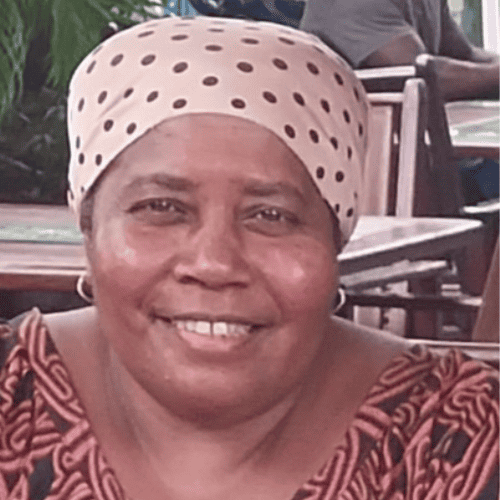
Mary Theresa Boni was recently appointed as the Executive Director of Project Sepik, an NGO in Papua New Guinea (PNG). The Sepik River, in Western PNG, is one of island’s most significant waterways and ecosystems, rich in biodiversity and supporting the livelihoods and cultures of hundreds of thousands of Indigenous peoples.
Project Sepik was established to respond to the threats posed to these Indigenous peoples and the Sepik River ecosystem by the proposed Frieda River mine and dam on one of the Sepik’s main tributaries. Through Project Sepik, Mary and others are spearheading the Save the Sepik campaign.
Mary is an experienced advocate and human rights defender, and participated in DTP’s Business and Human Rights Program in PNG in November 2019. She said that the DTP training helped her broadening her perspectives on campaign and advocacy while expanding her network:
“DTP’s training was a transformative experience that opened my eyes to the power of regional and global mechanisms in support of local advocacy efforts. It equipped me with the knowledge and skills to navigate complex international systems for the betterment of my community. The practical nature of DTP training allowed me to gain a hands-on understanding of how to effectively engage with international stakeholders. It reinforced the importance of collaboration and dialogue in addressing developmental issues.”
Mary credits her commitment to justice to her upbringing in a modest family in a remote part of PNG, and a childhood that was infused with the teachings of Christianity that instilled in her a strong sense of right and wrong. Growing up, she witnessed firsthand the challenges faced by her community due to the lack of basic government services. This early exposure planted the seeds of her dedication to social and environmental causes.
Still, it was not and is not, easy to be a women’s human rights defender in PNG, a country that is known for its patriarchy and for the prevalence of gender based violence. Opposition to mining and logging can be particularly risky because of the nexus of foreign companies and local politicians.
Mary’s journey into advocacy began when she joined a legal NGO trying to stop illegal logging. She became a passionate litigator, representing marginalised landowners against powerful logging companies. Her work involved taking on cases of land encroachment, timber exploitation, and trespassing.
Mary highlighted that women have faced particular challenges when trying to engage in public discourse in PNG. In many cases, they needed the support and approval of community elders or leadership to be heard. However, she is heartened that this is changing, as more women take on leadership roles in various sectors, gradually breaking down these barriers.
Mary has been actively involved in various boards and committees, contributing her expertise to organisations such as the PNG Forest Certification and the National REDD+ Policy Board. Apart from her role in Project Sepik, Mary’s commitment to the sustainable management of PNG’s natural resources is evident in her participation in technical working groups focused on issues like environmental law, timber legality standards, and forest stewardship.
As local communities in PNG seek to save their forests and rivers from the impacts of mining and logging, Mary hopes that their efforts will be more widely recognised and supported by the international community.
“Local environmental defenders in PNG are the frontline defenders saving our planet. As custodians for their communities and future generations, their efforts benefit all of us. We can use international mechanisms and collaboration to help them – and to help the world meet its climate targets”.
Project Sepik is being supported by Jubilee Research Australia and AidWatch. People who want to learn more – or support the campaign can get more information here Save the Sepik campaign.
DTP acknowledges the traditional custodians of the land on which we work, the Bedegal people of the Eora Nation. We recognise their lands were never ceded, and we acknowledge their struggles for recognition and rights and pay our respects to the Elders – past, present – and the youth who are working towards a brighter tomorrow. This continent always was and always will be Aboriginal land.
Aboriginal and Torres Strait Islander peoples should be aware that this website contains images or names of people who have passed away.
DTP acknowledges the traditional custodians of the land on which we work, the Bedegal people of the Eora Nation. We recognise their lands were never ceded, and we acknowledge their struggles for recognition and rights and pay our respects to the Elders – past, present – and the youth who are working towards a brighter tomorrow. This continent always was and always will be Aboriginal land.
Aboriginal and Torres Strait Islander peoples should be aware that this website contains images or names of people who have passed away.
Privacy Policy | Terms of Use | Disclaimer | Policies
© 2022 Diplomacy Training Program | ABN 31 003 925 148 | Web Design by Studio Clvr